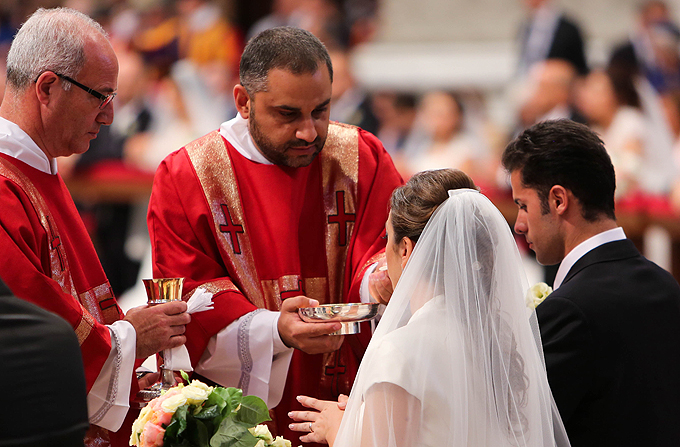Church has the obligation to find a pastoral way out
Although the pastoral care of the divorced and re-married Catholics cannot be naively limited to the reception of the sacrament of the Eucharist alone
Oct 15, 2015

By Fr Vimal Tirimanna, CSsR
Although the pastoral care of the divorced and re-married Catholics cannot be naively limited to the reception of the sacrament of the Eucharist alone, we cannot ignore the fact that this is an important issue for any conscientious pastor.
First of all, as Pope John Paul II himself says in Familiaris Consortio (FC) 57, “the Eucharist is the very source of Christian marriage.” If so, no juridical argument could justify the denial of such nourishing food for those who most need it, such as re-married Catholics.
Secondly, the gospels insist that Jesus came mainly for the sinners and not for the virtuous. It is those who have sinned who need his redeeming love and strength. As Pope Francis says, “The Eucharist, although it is the fullness of sacramental life, is not a prize for the perfect but a powerful medicine and nourishment for the weak.” The same view was re-echoed in the recent Synod hall when some Synod Fathers “emphasized that it is not the sacrament of the perfect, but rather, of those who are on the way.”
Thirdly, though the recent official Church teachings have been very welcoming to the divorced and re-married Catholics in every other aspect of Church living except the reception of the sacraments, it is precisely in not receiving the sacrament of the Eucharist today (when almost every other person goes and receives the Eucharist at Mass), that such people feel more marginalized and ear-marked.
As such, the Church has the obligation to somehow find a pastoral way out, to make at least some of the divorced and re-married Catholics in certain pastoral circumstances get the nourishing strength of the Eucharist. In no way does this mean that all re-married Catholics should be admitted to receive communion; rather, it is a matter of making the doors open to at least some of the re-married Catholics who have a worthy reason to receive communion, under certain well-defined pastoral conditions. Although none of the above-mentioned pastoral solutions, as we saw, is perfect in every sense, a serious prayerful invoking of the Holy Spirit, and a sincere willingness on the part of the decision- makers to leave behind their entrenched, theological/pastoral positions may surely open doors for innovative ways to find a solution, a solution that is, at the same, time faithful to the cherished Catholic Tradition. However, one also needs to note carefully that no single pastoral solution may fit all the categories of the divorced and re-married Catholics, either. It has to be an application of some of the solutions or one of them, under certain circumstances. This is precisely what many a Synod Father called “a case by case treatment” of the divorced and re-married Catholics. Pope John Paul II’s advice to pastors to make “a careful discernment” (Familaris Consortio No:84) when dealing with various cases of re-married Catholics should surely be the golden pastoral rule in this regard.
The solutions considered above, surely, will pave the way for further questioning, reflecting and deepening of the Catholic pastoral solutions, especially during this year between the two Synods, as requested by Pope Francis and the recently concluded Synod itself.
If the merciful attitude of Jesus, our Saviour, as so clearly shown in the gospels, does not fit into our own current moral-pastoral-juridical framework of marriage (as it seems to be the case), then, the vital, unavoidable question arises: is it the merciful attitude of Jesus towards sinners that has to change to suit our framework or is it our framework itself that has to change in order to suit that merciful attitude of Jesus?
The end-result of the current Synodal process is precisely to face this indispensable question squarely and give a substantial solution based on, and within, the cherished Catholic tradition. As the synthesis produced by the English-speaking Group B at the recent Synod said: “The Church must teach with clarity, but must also have the courage to knock on forbidden doors. Very often, when we find the courage to knock on forbidden doors, what we discover surprises us: what we encounter inside is the loving presence of God which helps us to address the challenges of today, no longer on our terms, but in new ways which might otherwise have been unimaginable. Knocking on forbidden or unaccustomed doors involves risk and courage. Fear and anxiety of what we think are forbidden doors may mean excluding opening ourselves to the God who always surprises us.”--Vidyajyoti Journal of Theological Reflection







Total Comments:0